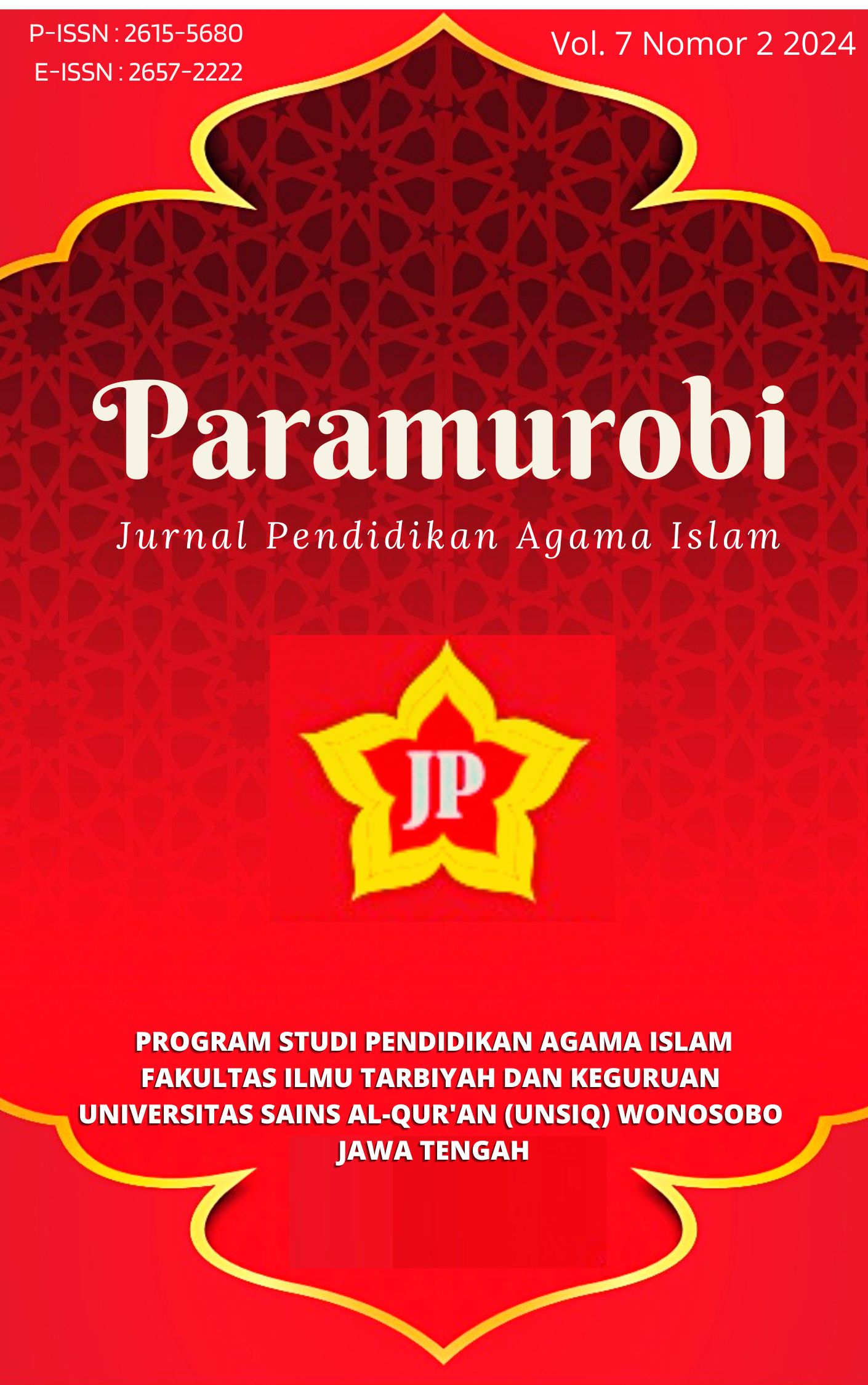SUMBER DAN MEDIA PENDIDIKAN ISLAM PERSPEKTIF AL-QUR'AN DAN HADITS
DOI:
https://doi.org/10.32699/paramurobi.v7i2.8132Keywords:
Audiovisual, Learning Outcomes, MediaAbstract
This research examines the importance of sources and media of Islamic education from the perspective of the Qur’an and Hadith. Islamic education covers all aspects of life, with the Qur’an and Hadith as its main sources. This topic was chosen because Islamic education does not only focus on spiritual and moral aspects, but must also be able to integrate modern technology and media in the learning process. In the midst of rapid technological development, the use of appropriate media is key to bridging students with the challenges of the modern world, strengthening religious understanding, and improving the quality of learning outcomes. This research uses the literature research method, collecting data from books, articles, journals, and online sources. The results show that the Qur’an, As-Sunnah and ijtihad are the main sources of Islamic education, while educational media, both traditional and modern, have proven effective in stimulating interest in learning, strengthening memory and improving students’ academic performance. This research also emphasizes the need for continuous innovation in the development of Islamic education media to face the challenges of the digital era, while ensuring that Islamic values remain relevant and applicable in daily life.
References
Achmad, Patoni. Islamic Education Science. Publisher CV. Eureka Media Aksara, 2022.
Ahmad Syafi’i. "Video Media in Learning Islamic Religion Education." Sinergi International Journal of Islamic Studies 1, no. 2 (August 31, 2023): 48–54. doi:10.61194/ijis.v1i2.73.
Apiyani, Ani. "Optimalizing Human Resource Management In Islamic Education." Tahsinia Journal. Vol. 5, July 2024.
Arikunto, Suharsimi. Research Procedures Practical Approach. Jakarta: Rineka Cipta, 1992.
Chairunnisa Chairunnisa, Najwa Ammara Jauza, Dita Adinda Fitri, Hafiz Khudri Tanjung, and Syahril Amin. "The Role of Learning Media in Islamic Education." Guruku: Journal of Education and Social Humanities 1, no. 3 (July 8, 2023): 116–30. doi:10.59061/guruku.v1i3.239.
Darajat, Zakiah. Science of Islamic Education. 1st ed. Vol. 11. Jakarta: BumiAksara, 2014.
Fauzi, Achmad, Mohammad Erihadiana, and Uus Ruswandi. "Global Issues and the Readiness of Pai Teachers in Facing Them." Journal of Madaniyah 10, no. 2 (August 2020).
Hamdi, Setria Utama Rizal, Muhammad Redha Anshari, and Nurul Hikmah. "Utilization of Digital Learning Media in Islamic Education to Increase Literacy and Innovation in the Era of Modern Technology." Proceeding of Saizu International Conference on Transdisciplinary Religious Studies, November 15, 2022, 48-55. doi:10.24090/icontrees.2022.228.
Haryanti, Nik. Islamic Education Science. Cet 1. Malang: Mount Samudera Publisher, 2013.
Hidayat, Rahmat. Islamic Education Science Guiding the Direction of Indonesian Islamic Education. Mold 1. Lembaga Peduli Pengembangan Pendidikan Indonesia (LPPPI), 2016.
Hufron, Ahmad. "Learning Media Development (Review of Tafsir and Hadith Tarbawi)." LA-TAHZAN: Journal of Islamic Education 13, no. 2 (November 2021). doi:https://doi.org/10.62490/latahzan.v13i2.220.
Indah Puspita, Syahvira, and Meilia Kumala Sari. "Media and Learning Resources in Islamic Education Learning." Journal of International Multidisciplinary Research 2, no. 5 (May 2024). https://journal.banjaresepacific.com/index.php/jimr.
Khair, Hubbil. "The Qur’an and Hadith as the Basis of Islamic Education." Darul Ulum: Scientific Journal of Religion, Education and Society 13, no. 1 (2022).
Kharismatunisa, Ilma. "Innovation and Creativity of Islamic Religious Education Teachers in Utilizing Digital-Based Learning Media." Scaffolding: Journal of Islamic Education and Multiculturalism 5, no. 3 (September 23, 2023): 519–38. doi:10.37680/scaffolding.v5i3.3700.
Nasron, H, and Hafidzah Nurhasanah. "Islamic Religious Education Media and Learning Design." INNOVATIVE: Journal Of Social Science Research 4, no. 3 (2024): 11315-29.
Nurdin, and Muhammad Toto Nugroho. "The Role of Islamic Religious Learning in the Formation of Religious Character and Tolerance of Elementary School Students." JEE: Journal Evaluation in Education 1, no. 3 (2020).
Pirda, Bachtiar Syamsuddin, and Sitti Mutmainnah. "The Effectiveness of Audio Visual Media on Arabic Language Learning Outcomes in Speaking Skills of Class X Students of Sma Islam Athirah 2 Makassar," 2020.
Pito, Abdul Haris. "Learning Media in the Perspective of the Quran." Andragogy Journal of Technical Training 6, no. 2 (December 2018).
Pratama Abnisa, Almaydza. "The Effect of Learning Media on Islamic Religious Education Learning Outcomes at MTs Daarus Sa’adah Cipondoh Tangerang." EDUCATION: Journal of Education and Learning 4, no. 2 (2023): 2183-98. http://jurnaledukasia.org.
Septianingsih, Rifdah, Dessy Safitri, and Sujarwo. "Audio Visual Media in the Context of Ips Learning: Implications for Education in the Digital Age." SINDORO: Education Scholar 1, no. 5 (2023).
Sugiyono. Educational Research Methods: Quantitative, Qualitative, and R&D Approaches. Bandung: Alfabeta, 2015.
Surawan, and Muhammad Athaillah. Science of Islamic Education. Vol. 1. K-Media, 2021.
Umar. "The Role and Function of Educational Media in Learning." Journal of Tarbawiyah 11, no. 1 (July 2014).
Ya’cub, Mihmidaty. "Educational Media in the Perspective of Quran Hadith and Its Development." CENDEKIA: Journal of Islamic Studies 4, no. 2 (December 2018).
Downloads
Published
Issue
Section
License
Copyright Notice
1. Authors retain copyright and grant the journal right of first publication with the work simultaneously licensed under a Creative Commons Attribution License (CC BY-SA 4.0) that allows others to share (copy and redistribute the material in any medium or format), and adapt (remix, transform, and build upon the material) the work for any purpose, even commercially with an acknowledgement of the work's authorship and initial publication in this journal.
2. Authors are able to enter into separate, additional contractual arrangements for the non-exclusive distribution of the journal's published version of the work (e.g., post it to an institutional repository or publish it in a book), with an acknowledgement of its initial publication in this journal.
3. Authors are permitted and encouraged to post their work online (e.g., in institutional repositories or on their website) prior to and during the submission process, as it can lead to productive exchanges, as well as earlier and greater citation of published work (See The Effect of Open Access).





